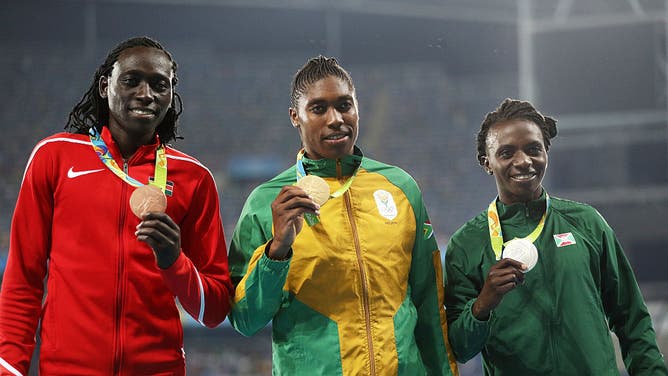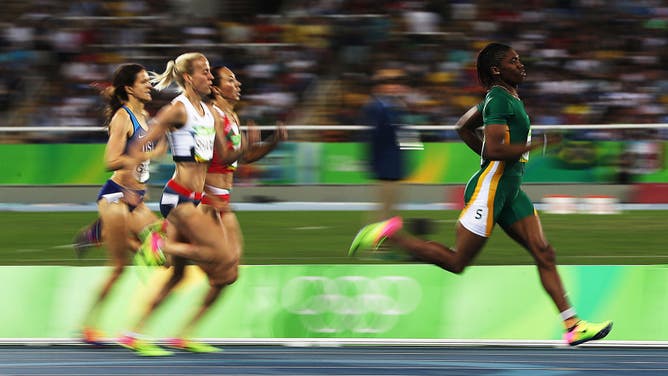Olympic Champ Says Being Born With Internal Testicles Doesn't 'Make Me Less Of A Woman'
The South African track star has not competed since 2018, when World Athletics revised its policy to require DSD (differences of sex development) athletes to reduce their testosterone levels to compete in women's events.
In a recent interview with the BBC, Semenya said the policy is discriminatory.
"For me I believe if you are a woman, you are a woman," Semenya told the BBC.
"I have realized I want to live my life and fight for what I think and I believe in myself. I don't care about the medical terms or what they tell me. Being born without a uterus or internal testicles. Those don't make me less of a woman. I am a woman and have a vagina just like any other woman."
This isn't your average transgender athlete story. It's a little more nuanced.
See, Semenya is intersex — meaning they have both male and female genitalia. Although the 32-year-old was born with a vagina, Semenya does not have a uterus, fallopian tubes or ovaries and does not experience menstruation. But Caster does have XY chromosomes, undescended testicles, and naturally high testosterone levels in the typical male range.
And that's the issue. As far as athletic performance is concerned, Semenya is male.
But the track star has always competed with females — and won by large margins. Semenya has more than a dozen gold medals, including three World Championships, five African Championships and two Olympic wins.
Semenya's times in the 400m, 800m, 1,000m and 1,500m times are all National Records.

The entire podium for the women's 800m final at the 2016 Summer Olympics consisted of XY intersex athletes with male levels of testosterone. (Patrick Smith/Getty Images)
One of Semenya's Olympic golds came at the 2016 Summer Olympics in Rio de Janeiro. Interestingly enough, the silver medalist, Francine Niyonsaba, and the bronze medalist, Margaret Nyairera Wambui, are also XY intersex athletes.
Noticing the obvious problem here?
Caster Semenya Refuses To Lower Testosterone
Luckily, track and field's governing body wised up and changed its policies to protect female athletes.
Under current World Athletics regulations, DSD athletes like Semenya must reduce their blood testosterone level to below 2.5 nanomoles per liter to compete internationally in the female category of any event.
WA said last week that it had 15 years "of data, observations and information directly from DSD athletes in our own sport that show high testosterone levels do provide an unfair advantage in the female category — and that our guidelines on testosterone thresholds are necessary, reasonable, and proportionate in our aim to protect the integrity of the female category."

(Photo by Ian MacNicol/Getty Images)
But that hasn't stopped Semenya from fighting back.
Semenya refuses to take hormones — citing the health risks. And that's certainly the athlete's prerogative. But per the rules, Semenya cannot compete in female international track and field events. Caster is welcome to compete with males.
The South African even tried to challenge the DSD regulations, but the case was rejected at the Court of Arbitration for Sport and the Swiss Federal Court. But the European Court of Human Rights ruled in July that the Swiss government failed to protect Semenya's human rights.

(Photo by Andy Lyons/Getty Images for World Athletics)
"I am not going to be ashamed because I am different," Semanya said. "The importance of women's sport is not being taken seriously and we need to take charge of our own bodies. Decide what is right for us. Not another gender deciding what we should look like. I am not going to be somebody I am not."
And that's where you're wrong, Caster. See, "taking women's sport seriously" means protecting its integrity. It means promoting fairness and not allowing athletes with 15 times the testosterone levels of their opponents to dominate the podium.
And that's what it all comes down to: fairness, science and common sense.
Caster Semenya has a significant biological advantage. And yeah, it's the testicles.
Follow Amber on X at @TheAmberHarding or email her at Amber.Harding@OutKick.com.